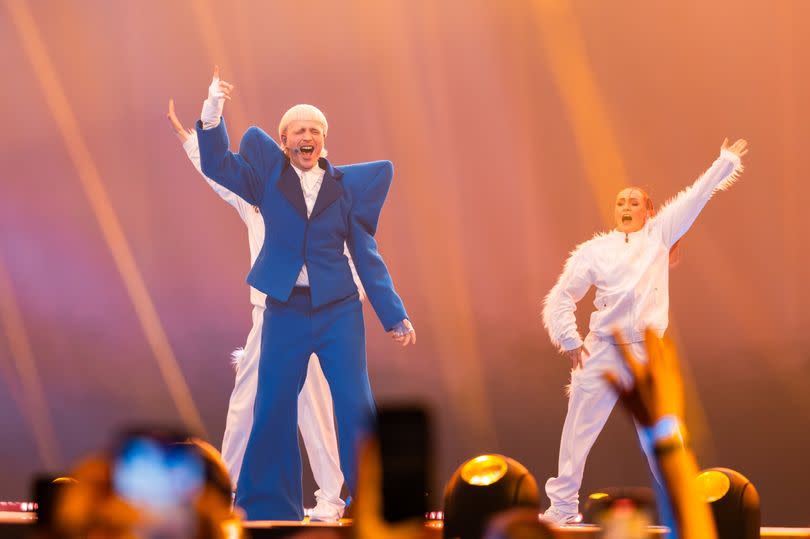The tragic story behind Netherland's Joost Klein's song Europapa as he's axed from Eurovison Grand Final

Dutch Eurovision act Joost Klein was dramatically axed from the Eurovision Grand Final just hours before its start on Saturday, May 11. It came a day after Klein was stopped from rehearsing for the event's big finale. Today it was announced that Swedish police were investigating allegations of inappropriate behaviour, the European Broadcasting Union said.
Entering with the song Europapa, a tribute to his late parents, the 26-year-old rapper and singer from the Netherlands had qualified for the grand final on Thursday evening at the Malmo Arena venue in Sweden. Swedish police have since investigated a complaint made by a female member of the production crew after an incident following the performance during the semi-final.
The Eurovision Song Contest entry for the Netherlands has already proved a massive hit in its home country with the music video on YouTube breaking the national record there. What comes across as an energetic pop punk Dutch hit actually has a sweet tribute behind it. Want less ads? Download WalesOnline’s Premium app on Apple or Android
READ MORE: Who is Malin Akerman? The Hollywood star hosting Eurovision who's been in some massive films
The musician, writer and artist from Leeuwarden, whose energetic style combines elements from mainstream pop with happy hardcore and pop punk, pays tribute to his parents, Hans and Ella, with his Eurovision song, Europapa. The artist, who won the prestigious Popprijs 2023, which is awarded annually in the Netherlands to the band or artist that has had the most impact in Dutch pop music that year, lost both his parents within a short time of each other.
At the age of 12, Klein lost his father to cancer. A year later, in 2011, his mother died of a cardiac arrest. Following the deaths of his parents, Klein was looked after by his older brother and sister.
At the end of Europapa, an upbeat track in line with the Eurovison's camp and silly remit, Joost sends a message to his late parents. His dad was one of Joost’s biggest inspirations and told Eurovision news blog, Wiwi: “My dad is one of my biggest inspirations and my dad taught me to open my mind. He told me not to look at labels. People are people.”
The artist has been praised for his poetic lyrics combined with catchy beats that capture the spirit of youth. In the Netherlands, Joost tours regularly with his band and has played festivals like Lowlands and Pinkpop. In November, he gave two sold-out concerts at Amsterdam’s 6,000-capacity AFAS Live.
Last summer, Klein had a number one hit in Germany, Switzerland and Austria with Friesenjung. The song has had over 100 million streams worldwide and won Best Song in Germany's 1LIVE Krone radio awards.
During his interview with Eurovision blog, Wiwi, he continued: "I've always tried to implement my life story and the shortest version is I lost my parents at a very young age. And I'm 26, I've got a chance to use this platform to share this emotion."The story of an orphan trying to get home, that's the main core of it. And my dad was one of my biggest inspirations and he had a very open mind. He taught me to not look at labels, people are people and that's where it ends."
Klein has also been overwhelmed by the response to Europapa saying he was "honoured" over listeners' reactions. "It was so cool to see this Dutch, I'm speaking Dutch, I didn't have to translate it, I feel very honoured to make connections around the world. I think my dad would laugh very hard, I think my mom would be very proud, but my dad would be making a lot of jokes about my suit."
He was outspoken at recent press conferences at the Eurovision Song Contest when Klein told Israeli act Eden Golan she should answer a question on whether she is comprising the safety of other contestants at Eurovision. A journalist asked Golan: “Have you ever thought that by being here you bring risk and danger for other participants and public?”
When Golan was told by the moderator that she did not have to answer the question, Klein chimed in, saying: “Why not?” Golan said: “I think we’re all here for one reason, and one reason only, and the EBU (European Broadcasting Union) is taking all safety precautions to make this a safe and and united place for everyone, and so I think it’s safe for everyone and we wouldn’t be here (if not).”
The Israeli act also said she was “overwhelmed with emotions” and that she was “super excited to go on stage once more, and share … my love with everyone”. Earlier, when Klein was asked if his song can unite people by music, he replied: “I think that’s a good question for the EBU.”
During the semi-final, Golan was applauded and cheered by the audience while singing Hurricane, which was reworked from an early song, October Rain, thought to be reference to the attacks by Hamas. Israel has faced calls to boycott the competition following the outbreak of conflict in the Gaza strip in October.
You can keep up to date with the latest TV and showbiz news by signing up to the newsletter here.

 Yahoo News
Yahoo News 
